A discourse analysis about career and social status of the Vietnam working class: A case study from Binh Duong province, Vietnam
In recent years, there have been more studies on the Vietnamese workers’ life in
the industrial zones. However, the research on career and social status of the
workers is still a desert. This article investigates how Vietnamese workers
perceive their career and social status. Data were collected through survey by
quantitative questionnaire and in-depth interviews with 800 samples in industrial
zones of Binh Duong Province of Vietnam. Finding results show that: (1) The
workers evaluated their career and social status at an average level in compared
to other classes in society. (2) With an average level, the voices of workers have
not received adequate attention from the companies, government and unions when
conflict of interest occurs. The workers’ experience in daily social interaction is
one of the reasons why workers perceive themselves in lower status than other
classes in the social hierarchy. Further studies should be paid attention to
individual experience through discourse to understanding the worker’s life.
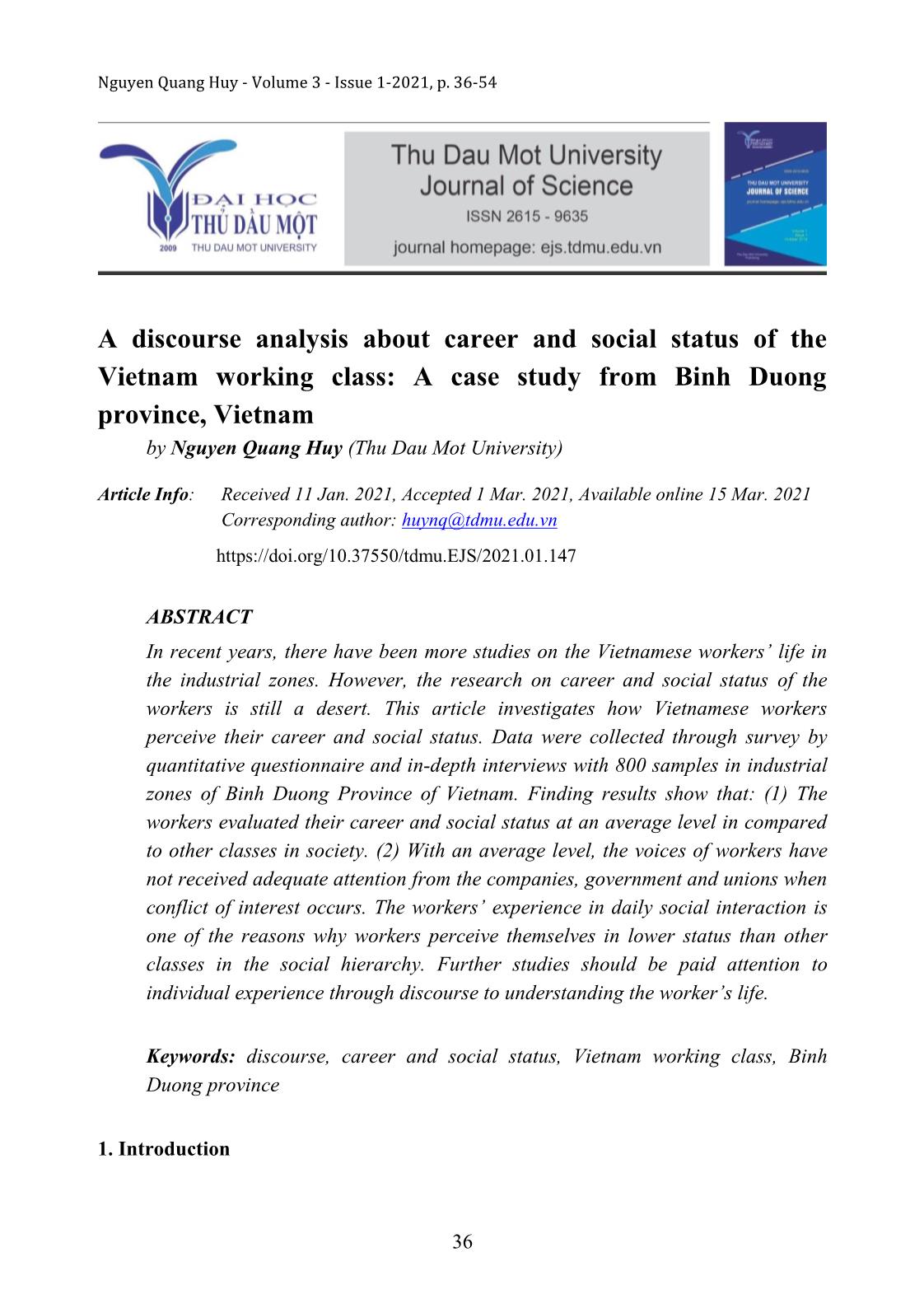
Trang 1
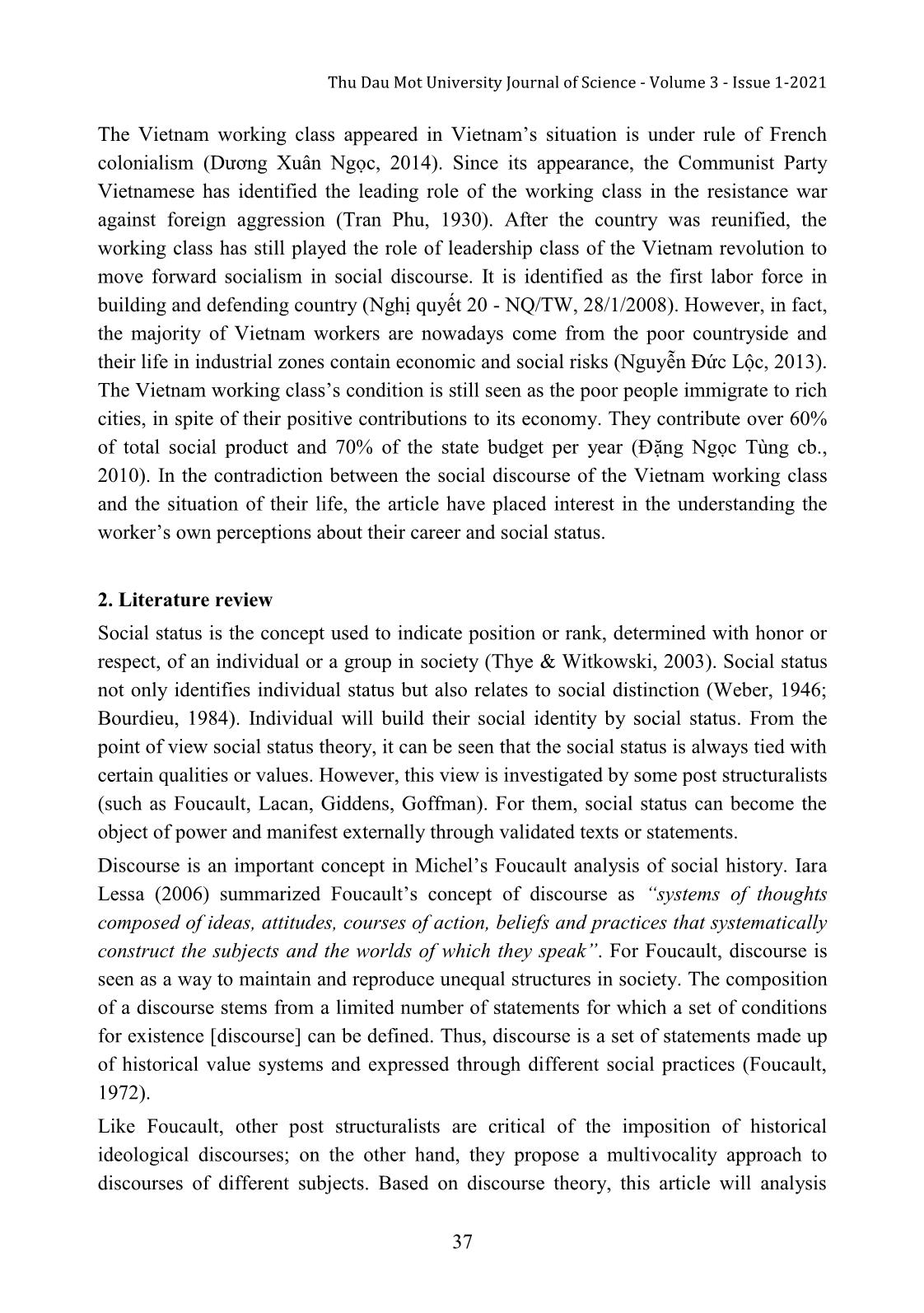
Trang 2
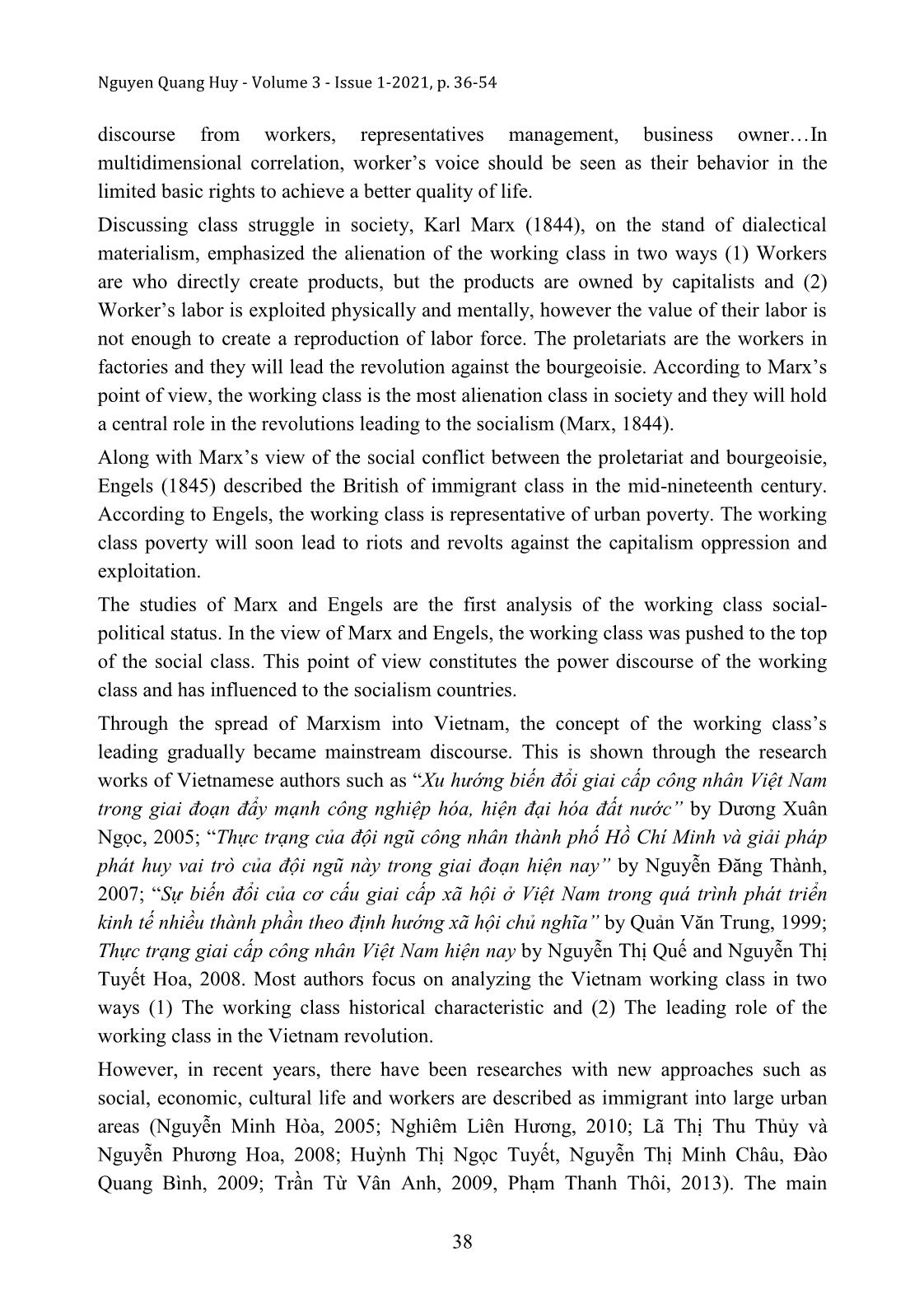
Trang 3
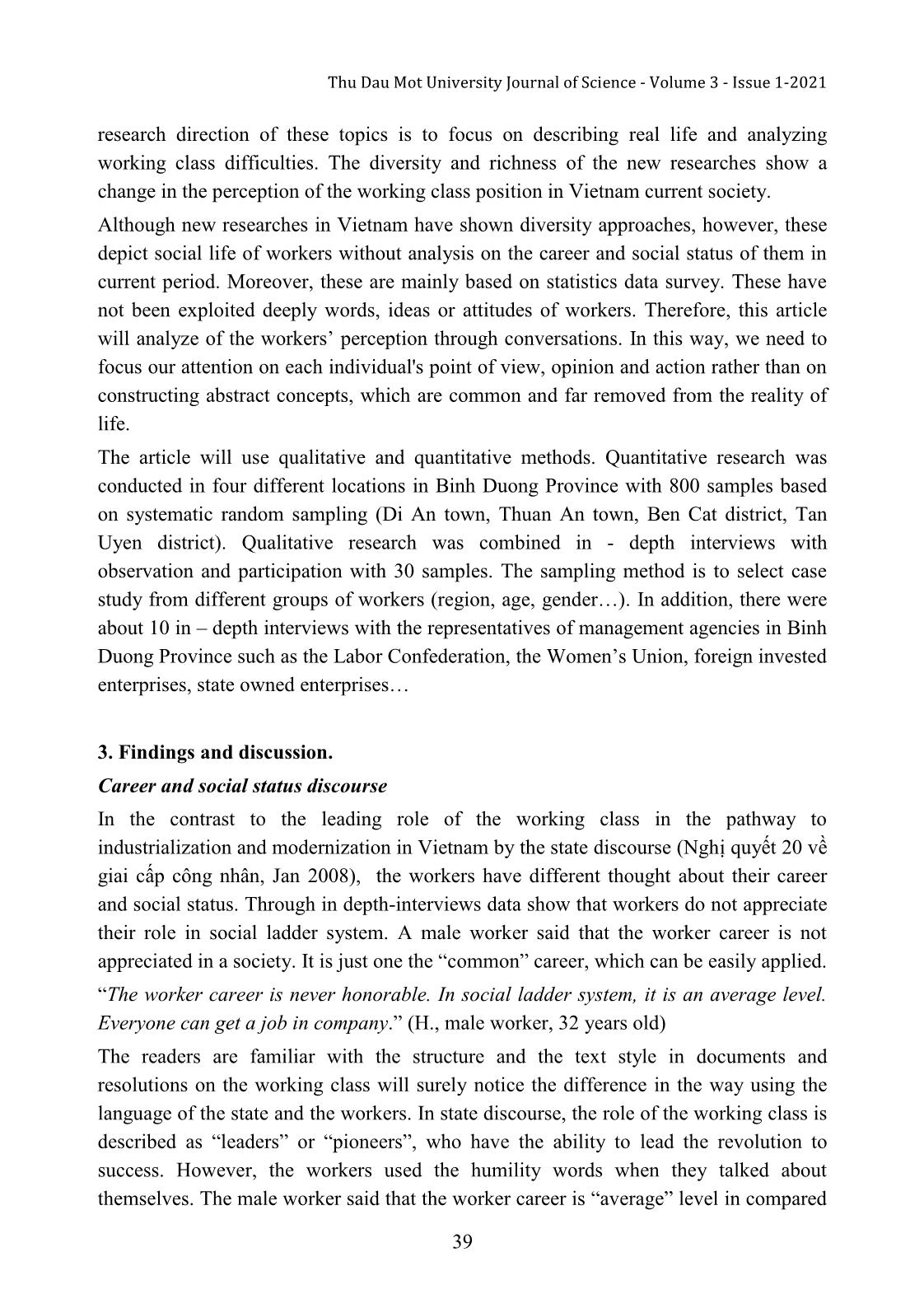
Trang 4
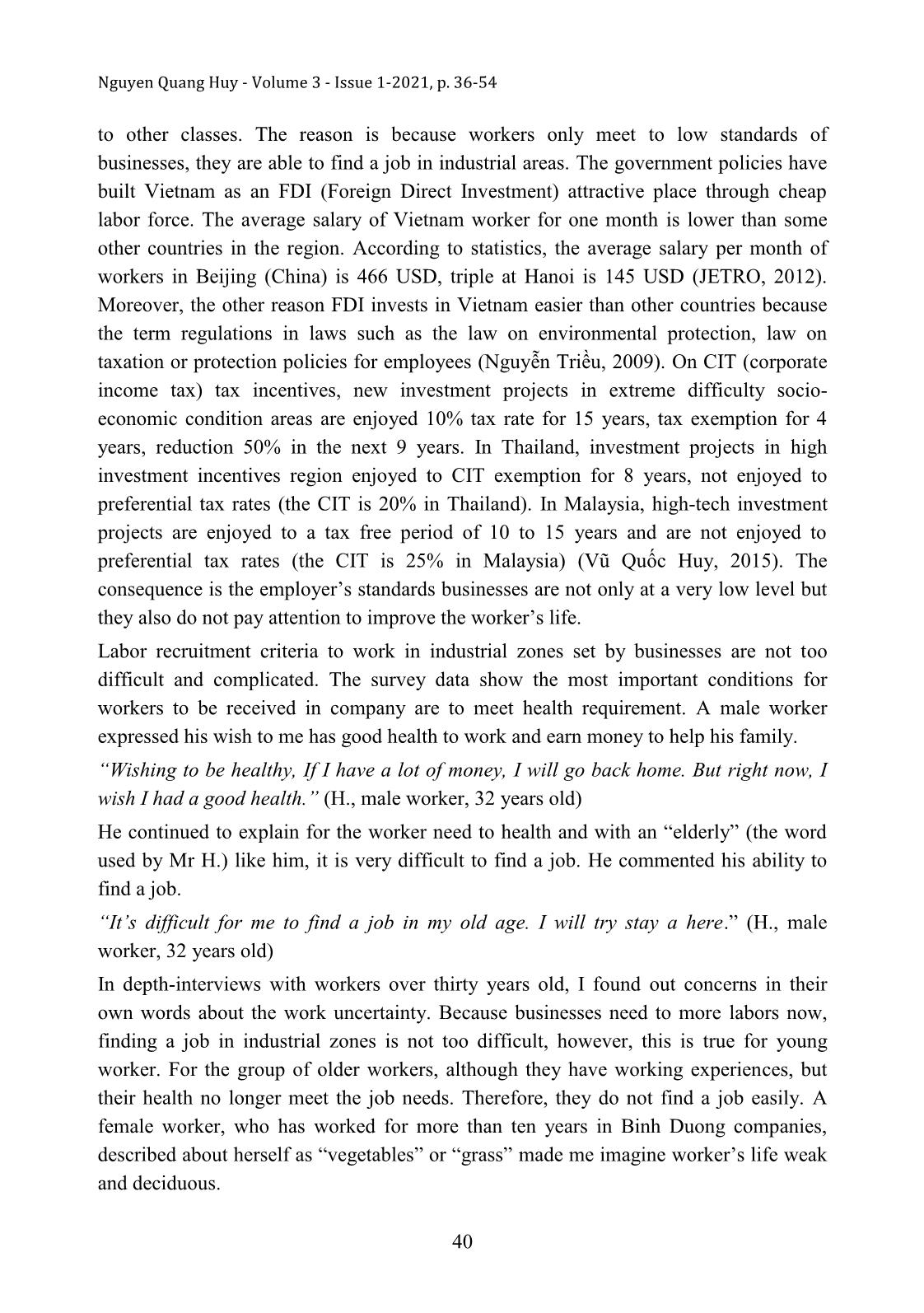
Trang 5
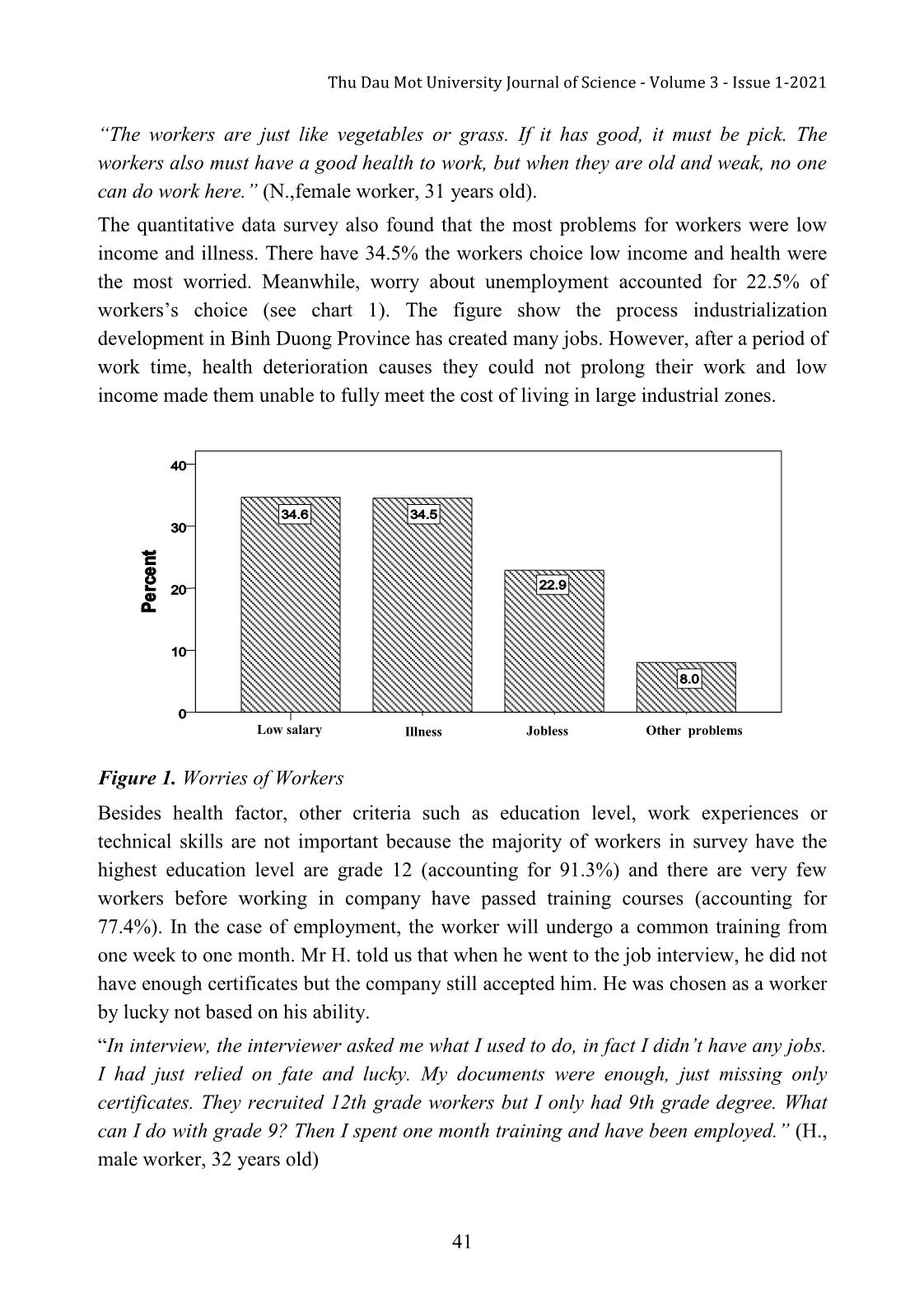
Trang 6
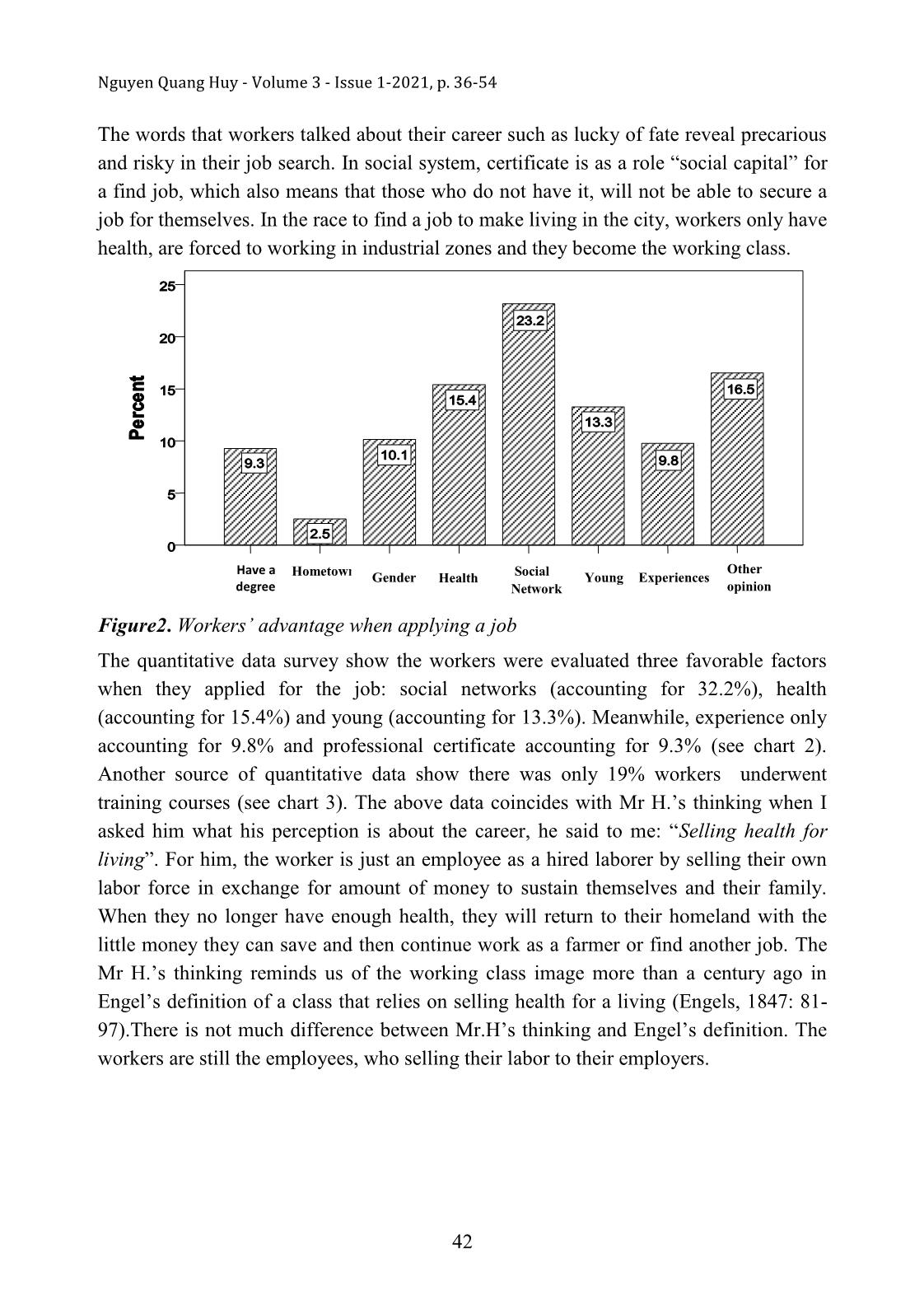
Trang 7
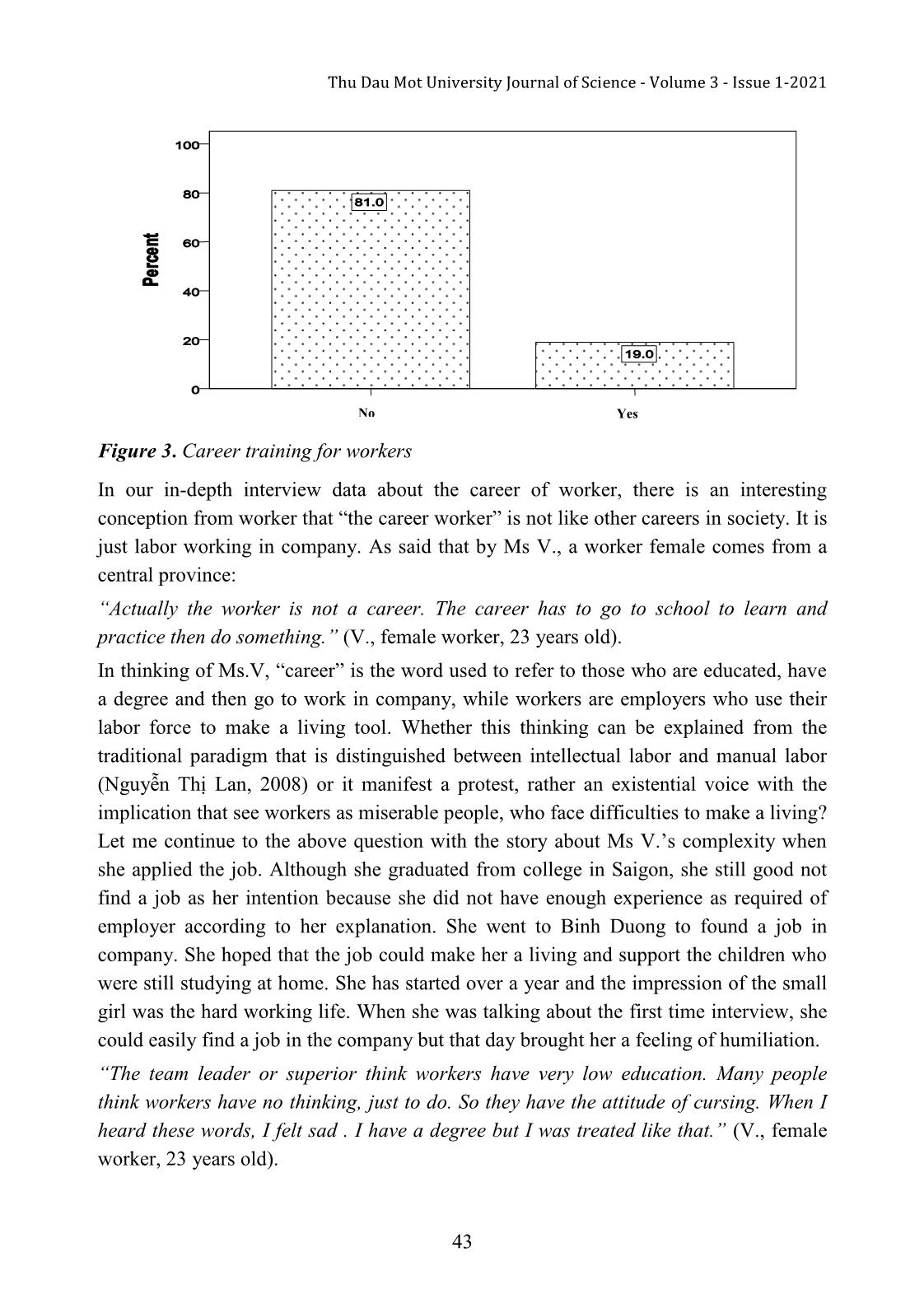
Trang 8
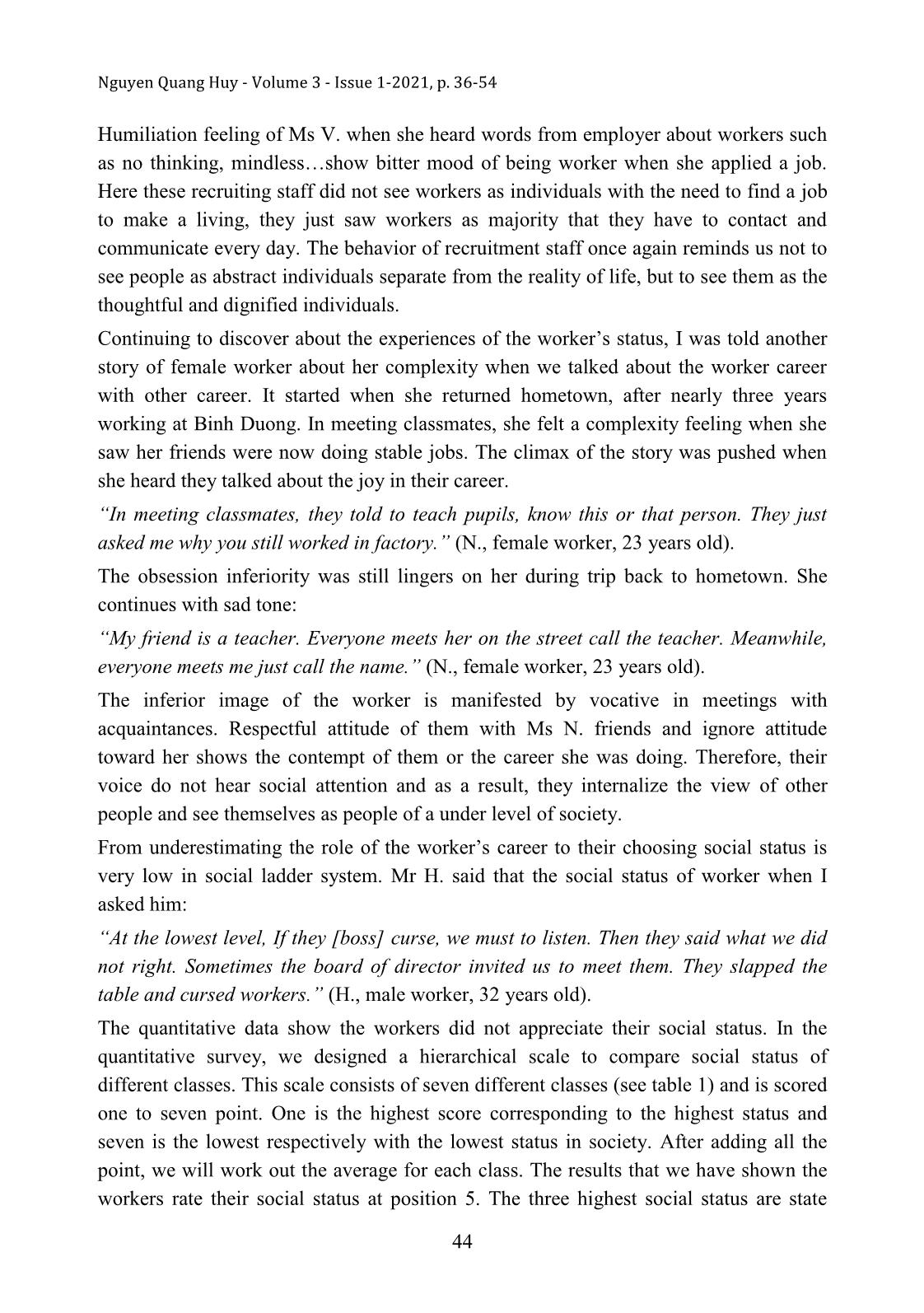
Trang 9
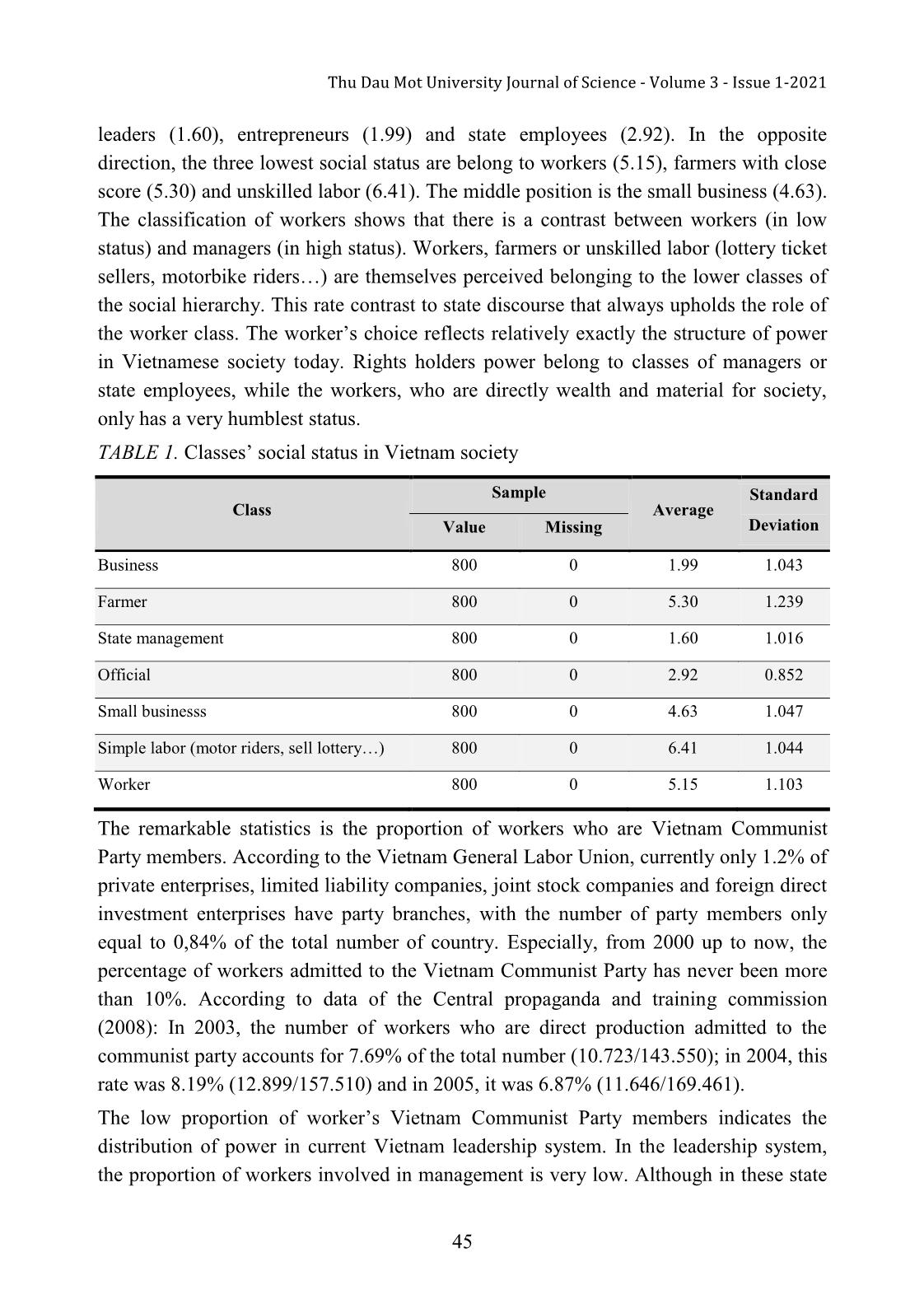
Trang 10
Tải về để xem bản đầy đủ
Tóm tắt nội dung tài liệu: A discourse analysis about career and social status of the Vietnam working class: A case study from Binh Duong province, Vietnam
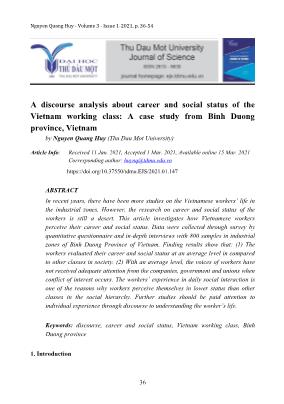
in the company there are regulations on keeping workers’ Tet salary to prevent they will not return. But she thinks most of workers disagree with this regulation. However, they could not speak out, because: “Because of the people cannot make the money to pay for the family, so they are afraid of being fired.” (Ms L., female worker) The worker’s limited voice is also correlated with ineffective management of local government. According to the workers, ineffective management of local government due to the lack of interest in worker’s lives. “The local government doesn’t strict management with the companies. It abuses the labor force of worker but they rarely intervene.” (L., female worker) At another level of management is the union organization, which is seen as representing worker’s voice, but as Mr M.Q.T said the union’s role is limited due to the space gap. When the union is usually not located near industrial zones. “There is only labor union but it is far away. If I want to go there, it will take me a lot of time.” Through our research, the trade union also falls into a “passive” position in resolving conflicts of interest between company and worker. Trade union intervenes when there are signs of strike of workers, in other words, they only get involved when disputes between company and worker become so intense that they cannot be reconciled. The Strike labor Quit job Cook rice at home Feedback to trade union Do nothing Other opinion Nguyen Quang Huy - Volume 3 - Issue 1-2021, p. 36-54 50 trade union often settles in the direction of reconciliation between company and worker. Mr H., representing the labor union, answered us methodically about the role and duty of the trade union when handling the strike of workers. “The task of trade union is not to let the strike of workers break out. If it happens, there are two ways: Firstly, we claim the company meets interest of the workers. Secondly, if it beyond the resolve authority of us, we will inform the federation. They go to discuss the problem with company to solve”. The role of trade union was emphasized by Mr H. as the mediator between stakeholders. However, in my opinion, the root of the problem is not that the trade union acts as an intermediary in dispute resolution but the role of the trade union should be understand the mind and aspiration of workers. In fact, this aspect seems to rarely have attended from trade union and other organization. Through conservation with worker’s representatives, we recognized a pattern work style. Mrs T., who is working currently at the women union, shared us about her conciliation work. She told us about the conciliation the strike of workers at the company. The solution is usually told workers and then she persuades them to return to work. Like the trade union, the women union only stands out to reconcile the conflict between workers and company when the strike of workers happened. However, they don’t pay attention to conflict in everyday that lead to strikes. According to the workers, the biggest limit of the trade union is the little attention to worker’s opinion. As Ms L. said about giving Tet gifts to workers. According to her, the Tet gifts for workers must be based on their actual needs. Her opinion is that the trade union in her company should buy foods that are practical worker’s live such as cooking oil or MSG, but this was not heard by the trade union. Instead, she received cans of swallow water, which in her judgment was not delicious. “My trade union is very bad. They don’t defend the workers. Like Tet gifts, they ask team leader’s opinion what gifts gave they the workers this year but when the team leader replied that the workers would to receive cooking oil or MSG, they said workers had all these things. Finally, they gave swallow water but it was not delicious.” Business judge similarly worker’s point of view when they think that trade union only play a supporting role in worker’s lives when they are facing difficulties. According to them, the trade union in the company is only formality. It doesn’t not take real benefits to workers. When we were asked if it was really necessary to establish a trade union in company, Mr. V, Head of human resource in FDI business, told frankly with us: “The law requires trade union checks social security and represent worker but it’s just a formality. While the employer pays the union’s salary.” Thu Dau Mot University Journal of Science - Volume 3 - Issue 1-2021 51 He concluded about the role of trade union just to “pay a fee”. Then when we continued to question whether the worker’s rights were really guaranteed without support from the union, he replied workers work to earn income to help themselves and family but rarely interested in participating in other social activities. When their benefits are guaranteed, workers do not need them trade union. “Workers go to work to earn income. If they have unsatisfied income, they need allowance, other income or the union must support them.” However, from the union’s perspective, Mr K., who represents for the confederation labor, told us the reason why the trade union are difficult to establish in businesses is that the presence of the trade union in the company give workers more voice. Moreover, it will increase understanding of laws for workers, thereby leading to business need to ensure more compliance with laws. According to him, most of the strikes of worker are caused by the business does not meet the employee’s rights in term of salary and working regime. Business are dissatisfied when trade union provide legal support to workers as well as help them propose recommendations to authorities. Therefore, businesses are often “listless” and do not facilitate for the trade union. “In the past, many workers only knew how to work. They were not less demanded because they did not understand laws. When they more understood laws, they demanded the trade union to intervene. The business must to response laws for employees.” During interviews with union organizations and businesses, we found that they avoided directly answering questions whether they actually listened to worker’s voice. The limitation in the workers’ voice partly explains the conflict between the worker discourse and the state discourse about their position as mentioned above. Their voices do not receive positive feedback from leaders. Organizations represents worker such as the trade unions or women unions do not go into real world to listen their voice. It is for this reason workers lose trust in social organizations. Moreover, I realized behind the material poverty life is an extremely rich and complex inner world of the worker. Entered into their life world and established relationship with them, I felt that they opened to share opinions and feelings about problems in their life. Therefore, if we touch existential problems in real life of workers, we will create a close dialogue space. Then we can see on the other side of workers is human workers (human being) thinking and acting for their life. This suggests an approach that requires us to see workers as existences in their life world rather than as objects that exist in abstract categories. “The most current of such transformations occurs in storytelling and generally in artistic transposition of individual experiences.” (Hannah Areandt, 1958:50). Arendt’s statement reminds us to pay more attention to storytelling and experience’s individual rather than grand narratives. Nguyen Quang Huy - Volume 3 - Issue 1-2021, p. 36-54 52 4. Conclusion Since the birth of the Vietnamese Communist Party under the influence of Marxism – Lenin has attached the role of the working class to a historic mission as the main force and leading class of the revolution for national liberation and move on socialism. Despite going through many historical periods with different missions and objectives, the working class is still defaulted in official state discourse as a leading force to fight, defend and build the country. However, in contrast to the historical ideological discourse of the state, the survey data actually show that the workers did not appreciate their career and social status. They talked themselves by words such as: plants, vegetables, machinesetc. partly reflects the actual image of workers in industrial zones. All of above words are the discourse that reflects the living world of individual and thereby portrays a part of the immigrant workers. They are poor people in the countryside. For different reasons, they choose the big cities to seek opportunities to change their fate. From the perceptions of workers about the career and social status, it is shown the difference with state discourse about the social position of the working class. Workers’ experience in daily interactions with other individuals is one of the reasons that workers perceive themselves as a lower social status than other career in the system social hierarchy. Consequently, workers discourse shows a contradictory image of workers’ perceptions of the state discourse that has been “theatricalization” of the state as analyzed by James Scott (1985) of a positive image of the role and social status of the working class. This different in another point of view stems from the fact that the state discourse has been encoded in an economic - political framework of thinking which is dominated by historical value systems and thus frame workers in fix social roles and positions. As a result, the state discourse missed out the voice of the workers coming from their real life circumstances. 1. See more Nguyễn Đức Lộc’s analysis in his article Hiện trạng tiếp cận mức độ phúc lợi xã hội của công nhân tỉnh Bình Dương và đề xuất mô hình hợp lý, pp.65 in Đời sống xã hội Việt Nam đương đại (2015). Based on worker’s income per month, Lộc divided into five groups. The poorest group has an income of 800.000VND - 2.510.000VND (accounting for 21.3%), the second group has an income of 2.510.000VND – 3.000.000VND (accounting for 18.9%), the third group has an income of 3.004.000VND – 3.500.000VND (accounting for 20.8%), the fourth group has an income of 3.510.000VND – 3.998.500VND (accounting for 18.5%) and the group has highest income over 4.000.000VND (accounting for 20.6%). Reference Arendt, H. (1958). The Human Condition. Second Edition. Chicago & London: NXB The University of Chicago Press. Bourdieu, P. (1972). Outline of a Theory of Practice. Cambridge University Press. Thu Dau Mot University Journal of Science - Volume 3 - Issue 1-2021 53 Đặng Ngọc Tùng (chủ biên). 2010. Xây dựng giai cấp công nhân Việt Nam giai đoạn 2011 - 2020. NXB Lao động. Dương Xuân Ngọc. Luận bàn về giai cấp công nhân Việt Nam hiện đại - đặc điểm và sứ mệnh lịch sử của nó. Nguồn: diendanddkdt1.htm#. Truy cập ngày 10/11/2020. Engels, F. (1994). Tình cảnh giai cấp công nhân Anh. In trong Các Mác và Ph. Ăngghen toàn tập. Hanoi: NXB Chính trị Quốc gia. Engels, F.(1969). Những nguyên lý của chủ nghĩa cộng sản (The Principles of Communism). Paul Sweezy dịch. Selected Works. Volume 1. pp 81-97. Progress publisher Moscow. Foucault, M. (1972). The Archaeology of Knowledge. Translated by A. M. Sheridan Smith. New York: Pantheon. Foucault, M. (1974). Madness and Civilization. Bản dịch của Richard Howard. Vintage. Ấn bản 1, 1988. Huỳnh Thị Ngọc Tuyết, Nguyễn Thị Minh Châu, Đào Quang Bình (2010). Mạng lưới xã hội của công nhân nhập cư ở khu công nghiệp Biên Hòa. Tạp chí Khoa học Xã hội số 5, tr. 29 – 38, 2010. Lã Thị Thu Thủy (chủ biên). 2011. Thay đổi tâm lý của thanh niên công nhân xuất thân từ nông thôn. NXB Khoa học Xã hội. Lessa, I. (2006). Discursive struggles within social welfare: restaging teen motherhood. British Journal of social work 36. Marx, K. (1994). Bản thảo kinh tế học - triết học năm 1844. In trong Các Mác và Ph. Ăngghen toàn tập. NXB Chính trị quốc gia, Nghị quyết 20-NQ/TW. 28/1/2008. Hội nghị lần thứ sáu Ban Chấp hành Trung ương khóa X. Nghiêm Liên Hương. 2010. Tính liên tục của nông thôn - thành thị: Cuộc sống của công nhân may di cư tại Hà Nội, tr.289-306, trong Hiện đại và động thái của truyền thống ở Việt Nam: Những cách tiếp cận Nhân học. Quyển 1. NXB Đại học Quốc gia TP. Hồ Chí Minh. Nguyễn Đức Lộc. Hiện trạng tiếp cận mức độ phúc lợi xã hội của công nhân tỉnh Bình Dương và đề xuất mô hình hợp lý. Đề tài Khoa học Công nghệ tỉnh Bình Dương, 2011-2013. Nguyễn Minh Hòa. 2005. Vai trò của tổ chức trong việc chăm lo đời sống văn hóa tinh thần trong các khu công nghiệp tập trung tại TP. HCM. Kỷ yếu Hội thảo khoa học Đời sống văn hóa tinh thần của công nhân tại các KCN – KCX TPHCM, 12/2005. Nguyễn Thị Lan. Về dự định nghề nghiệp cho con của các bậc cha mẹ trong bối cảnh phát triển kinh tế tư nhân ở nước ta. Tạp chí Tâm lý học. Số 3 (108), 2008. Nguyễn Triều. 2009. Sông Thị Vải bị ô nhiễm: Vedan góp 90%. Đăng ngày 8/12/2009 trên báo Tuổi trẻ. Nguồn: http:// tuoitre.vn/tin/chinh-tri-xa-hoi/20091208/song-thi-vai-bi-onhiem- vedan-gop-90/351986.html. Truy cập ngày 10/11/2020. Phạm Thanh Thôi. 2013. Đời sống xã hội của thanh niên nhập cư lao động phổ thông tại các cơ sở sản xuất nhỏ ở TP. Hồ Chí Minh. Tạp chí Khoa học Trường Đại học Mở Tp.Hcm - số 5 (33), tr. 95-107, 2013. Sartre, J.P. 1956. Being and Nothingness an essay on phenomenological ontology. Dịch và giới thiệu bởi by Hazel E. Barnes. NXB Philosophical library New York. Nguyen Quang Huy - Volume 3 - Issue 1-2021, p. 36-54 54 Sartre, J.P. 1963. Saint Genet: Actor and Martyr. Dịch bởi Bernard Frechtman. NXB New York George Braziller. Scott, J. 1985. Weapons of the Weak: Everyday of Peasants Resistance, Yale University Press. Thye, S. & Witkowski, C. 2003. The Status Value Theory of Power: The Effect of Status and Resource Differentiation on Power in Exchange. Presented at the Annual Meetings of the American Sociological Association, Atlanta, GA. Trần Phú. 1930. Dự thảo luận cương chính trị. www. tapchicongsan.org Trần Tử Vân Anh (2009). Nghiên cứu quan niệm của công nhân về quyền đình công, nghiên cứu điển hình 20 công nhân tại hai công ty ở quận Thủ Đức TP. HCM (Luận văn Thạc sĩ ). Trường ĐH KHXH&NV TP. HCM. Vũ Quốc Huy (2015). Thu hút đầu tư nước ngoài tại Thái Lan, Malaysia và kinh nghiệm cho Việt Nam. Đăng ngày 27/3/2015 trên website khucongnghiep.com.vn. Nguồn: http:// khucongnghiep.com.vn/tabid/68/articletype/ArticleView/ articleId/1247/default.aspx. Truy cập ngày 10/11/2020. Weber, Max. (1946). From Max Weber: Essays in Sociology. Edited, translated, and with an introduction by H. H. Gerth and C. Wright Mills. Taylor & Francis. 2007.
File đính kèm:
 a_discourse_analysis_about_career_and_social_status_of_the_v.pdf
a_discourse_analysis_about_career_and_social_status_of_the_v.pdf

